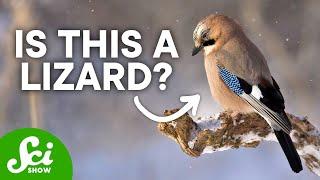
What is Taxonomy and Why is it So Complicated?
Комментарии:

damn you scishow for the call for action at the end. I always end up feeling so inspired to do research for everything science related!!!!!!
Ответить
And then people go and talk about reptiles and amphibians together, because some of them can look a bit similar.
Ответить
Quirks are we talking about MHA or taxonomy? LOL
Ответить
We need a new naming system that goes back further and splits based on definable traits, be they observable traits or genetic traits, that differentiate living organisms based on how they're related to one another. We could have a system where names are divided based on how closely things are related as a percentage where some more diverse species would have multiple high level names, such as Phylums, while more nuanced species would have more lower level names such as Genuses. We would need to define all creatures into this new system, which is a pain staking process, while keeping the old system running, and create a comprehensive transitional resource where names of organisms can be searched based on either system to allow for continued research. Once the new system contains all the creatures the old system documented, we can stop working on the old system and rely solely on the transitional resource to be able to still do research through outdated documents.
Ответить
Truly amazing content, this channel never ceases to amaze me, bravo! I am really so interested in the topics you discuss, they are on my mind, and then boom a sci show video explaining more!
Ответить
Kings Play Cards On Fat Green Spiders
Ответить
Birds certainly aren't lizards, but I have no problem calling them reptiles. Have you seen their legs? Beaks aren't an issue, Turtles have those too, the only difference is the flying and the feathers. If bats and porcupines both count as mammals, despite one flying and one having quills, I don't see an issue with reptiles who can fly and have feathers
Ответить
Aves is pronounced “Ahh-Ways” ? Wtf I’ve been pronouncing it as “Ayy-Ves”, like Ayyvians.
Ответить
morphometrics and meristics are dead in the water, genetics has proved that. I had this argument with a ridiculous russian ichthyologist in 1995/6.
Ответить
I kind of independently thought about the diversity thingy too. Here's my take - and I could be wrong, I am not super duper an expert.
I am not formally working in science, but I've had an interest in which genera are the largest (Agrilus [Coleoptera - Buprestidae], Tipula [Diptera - Tipulidae], and Astragalus [Fabaceae] to name three, not necessarily top three.) For consistency's sake we'll use Catalogue of Life.
According to that source, as of the November 2022 revision, there are 2339 accepted extant species of Rodentia, an order. Compare that with the plant genus Piper, with 2352 accepted extant species. But how many forms of Piper are widely recognizable? I certainly don't recognize most of them. It's usually the one that produces black pepper. (Edit: Did a Wikipedia search for this genus and I discovered long peppers.) But at least with rodents, while non-experts may not always be able to tell mice and rats apart, at least we recognize things like squirrels, beavers, capybaras, porcupines, and more.
So my point is that diversity of forms might influence the rank of a clade. Non-experts may not always pay attention to differences, maybe because they are too technical or too insignificant in detail

So, as a programmer the notion of shoehorning a new paradigm into a system coded for the old paradigm is pretty familiar. And from experience - Burn it down, stomp on the ashes. The overhead of trying to hobble along with the old ALWAYS is higher than the transition cost. Make the new system modular and data independent rather than tied to your paradigm.
Give species/subspecies a node. That node can have pointers to groups based on physical characteristics, niches, habitats, and genetic ancestry, but the species stands alone so you have the name no matter what is learned later about those relationships. By treating subspecies as an equivalent node you can define them independently and move them as needed as you learn more. So demoting a species to subspecies is just informational rather than changing the node. And you can even link phylogeny to a subspecies if you happen to figure out that kind of linkage or spin off new groups like subsubsubsubspecies if you need to.
And by making the groups mere linkages, you can view the listing dynamically by whatever criteria you need. You can generate a tree of life that is exclusive to Australia, or one that focuses on the physical characteristics that are what matters for biological needs or visual identification, all while also allowing for geneticists to move things around to sort out their species ancestry without toppling everything else.
That also means you can work with what you have. A gene sample without physical characteristics gets a node and is only linked as well as it can be. Footprints of an extinct animal get their own node and whatever linkages you can establish. And the bug collector can submit physical characteristics without genetic linkages. You will have things orphaned in whatever grouping they don't have data for, but we have that already with piles of things not in the system at all yet.
And as you discover more you can modify links, merge nodes, etc. as needed.
We live in the digital age. This doesn't need to have the overhead of specialists that have to decide the whole tree for every species. Just create a node for review and let the experts of each field link their parts and allow the system to hold onto what information we do have about species we don't yet have time to link up.
Odds are pretty good someone will even create a narrow AI to set proposed linkages for you to save time.
Given what a mess cladistics has become, this is going to have to happen eventually, and it's cheaper the sooner you do it. And in this case it would keep a lot from being lost and squash the mindset of system over reality.

Nice to know how well-recognized the inconsistencies and often weird logic of taxonomy is. I just started learning this stuff and realizing how many weird or contradictory things there are in classifying life. I chalk it up to the fact it's a somewhat arbitrary art, as well as us having a lot more to learn to try to connect the dots on the tree of life.
Ответить
AI could help you solve that problem. You just need a generous donor like Google maybe.
Ответить
The problem with automating taxonomy with DNA comparisons is that different genes are expressed differently. For example, the vast majority of human DNA is junk DNA that is not expressed at all. It's totally unused filler data, like the portion of your hard drive that doesn't have anything saved on it, but it has the storage hardware anyway. Somehow, this DNA comparison would need to simulate gene expression to identify the significance of each gene in determining similarity. This is something we are nowhere near being able to accomplish.
Ответить
Imagine if chordates is the 2nd largest phylum of animals, after arthropods and surpassing mollusks, if vertebrates make up more than 20% of the animal kingdom, with over hundred thousands of species of vertebrates (more species, genus, families and orders of each mammal, bird, reptile, amphibian and fish altogether.
Ответить
It would be scientifically accurate if ungulates is the correct order of mammals that have hooves, regarding the number of toes, whether it’s even or odd toed, which the order includes horses, pigs, deer etc. imagine if there are hundreds of species of odd-toed ungulates with more than 3 living and extinct families of odd-toed ungulates, comparable to even-toed ungulates when they should both belong to the same order, sharing a common ancestor, which ungulates doesn’t just mean hoofed mammals, which both even and odd-toed ungulates should not be separate orders.
Ответить
Can Taxonomists answer the big question - 'What is a woman?'
Ответить
Ahh yes, time to reorganize and sort of simplify science for the future!
I'm so excited to see if this will work better than our current system once it's well implemented.








![Mox Jade - Devotion EP (The Remixes) [Full Album] Mox Jade - Devotion EP (The Remixes) [Full Album]](https://invideo.cc/img/upload/VU1JaklOdDFVMFo.jpg)

















